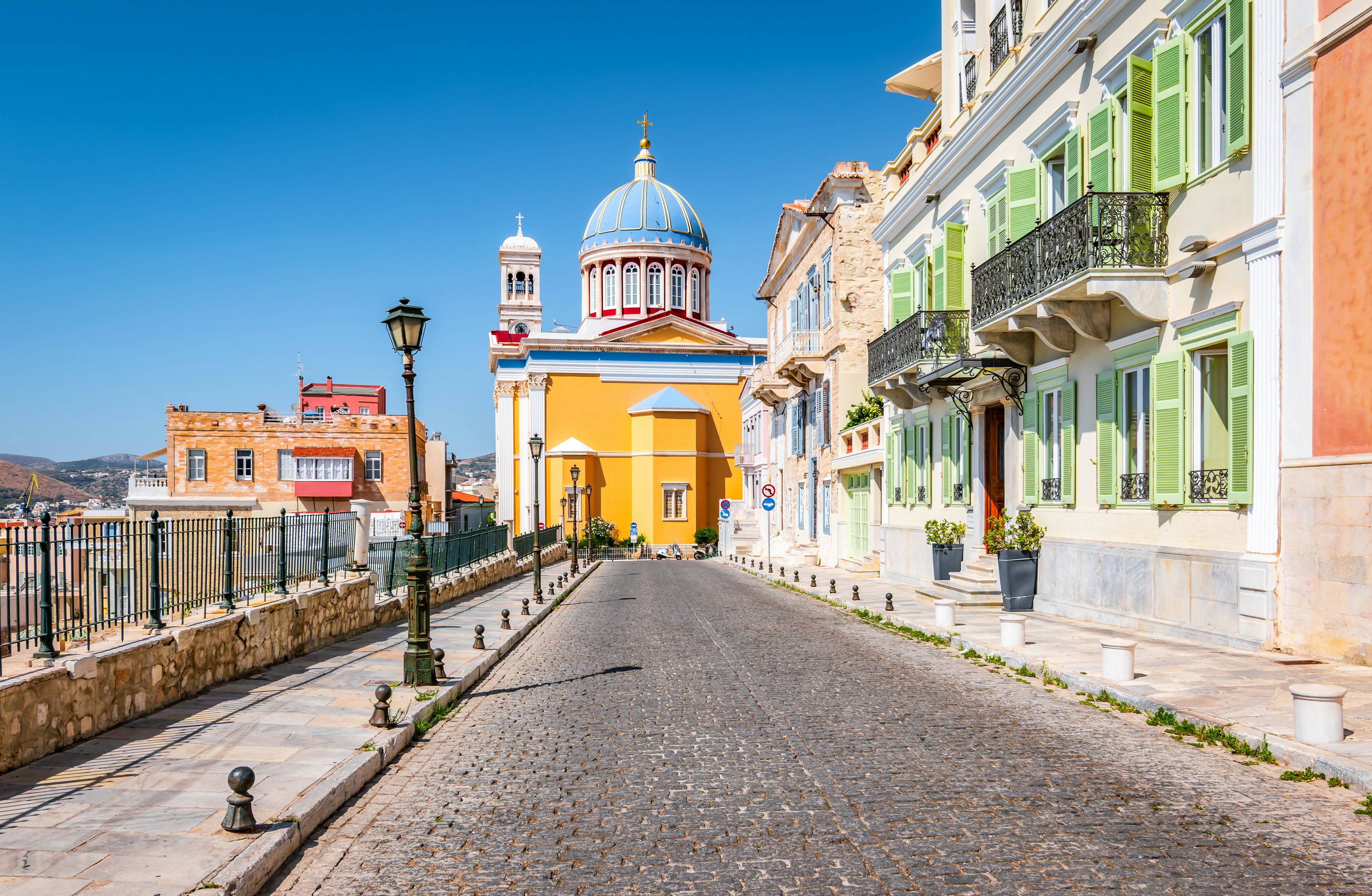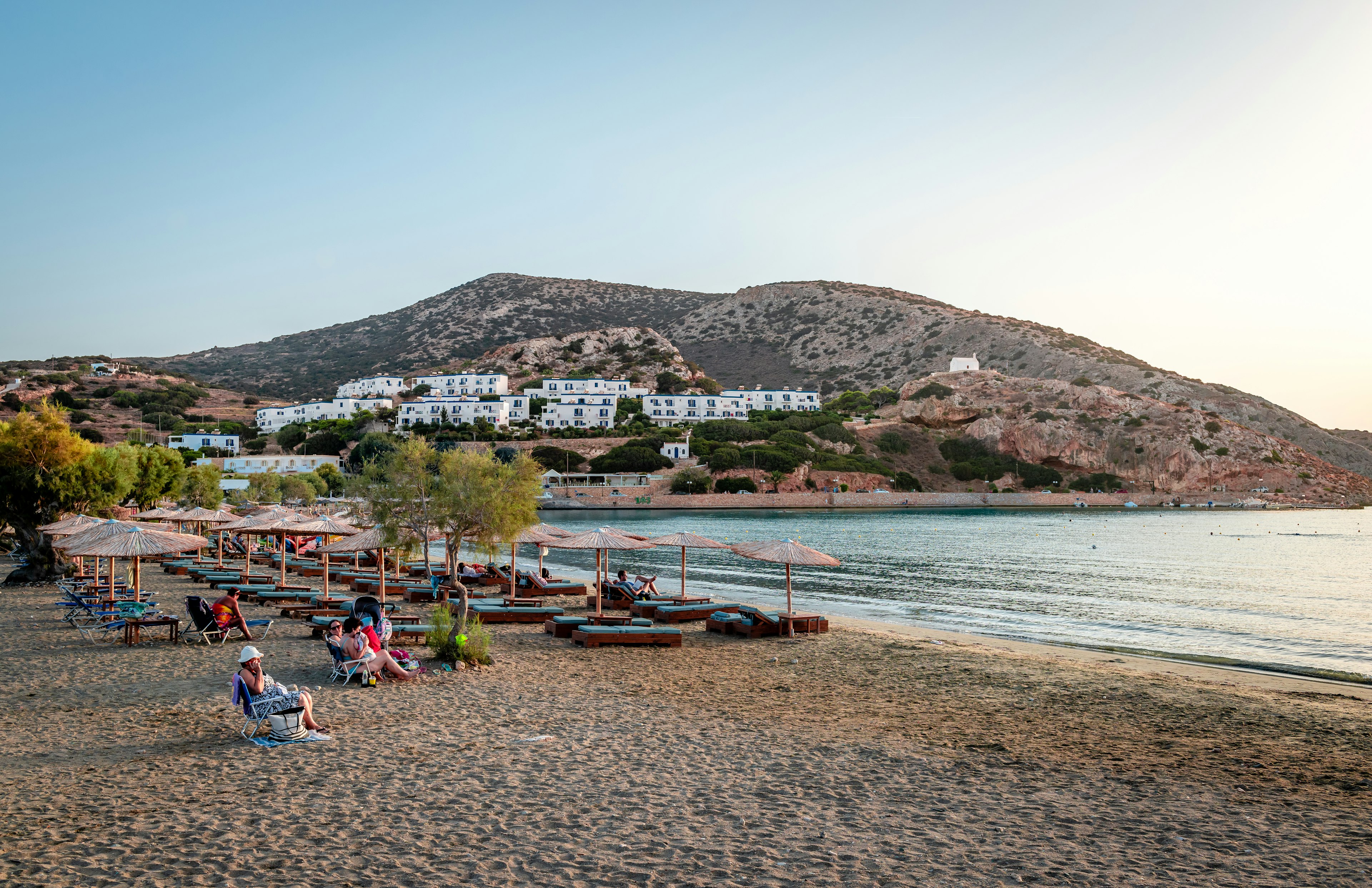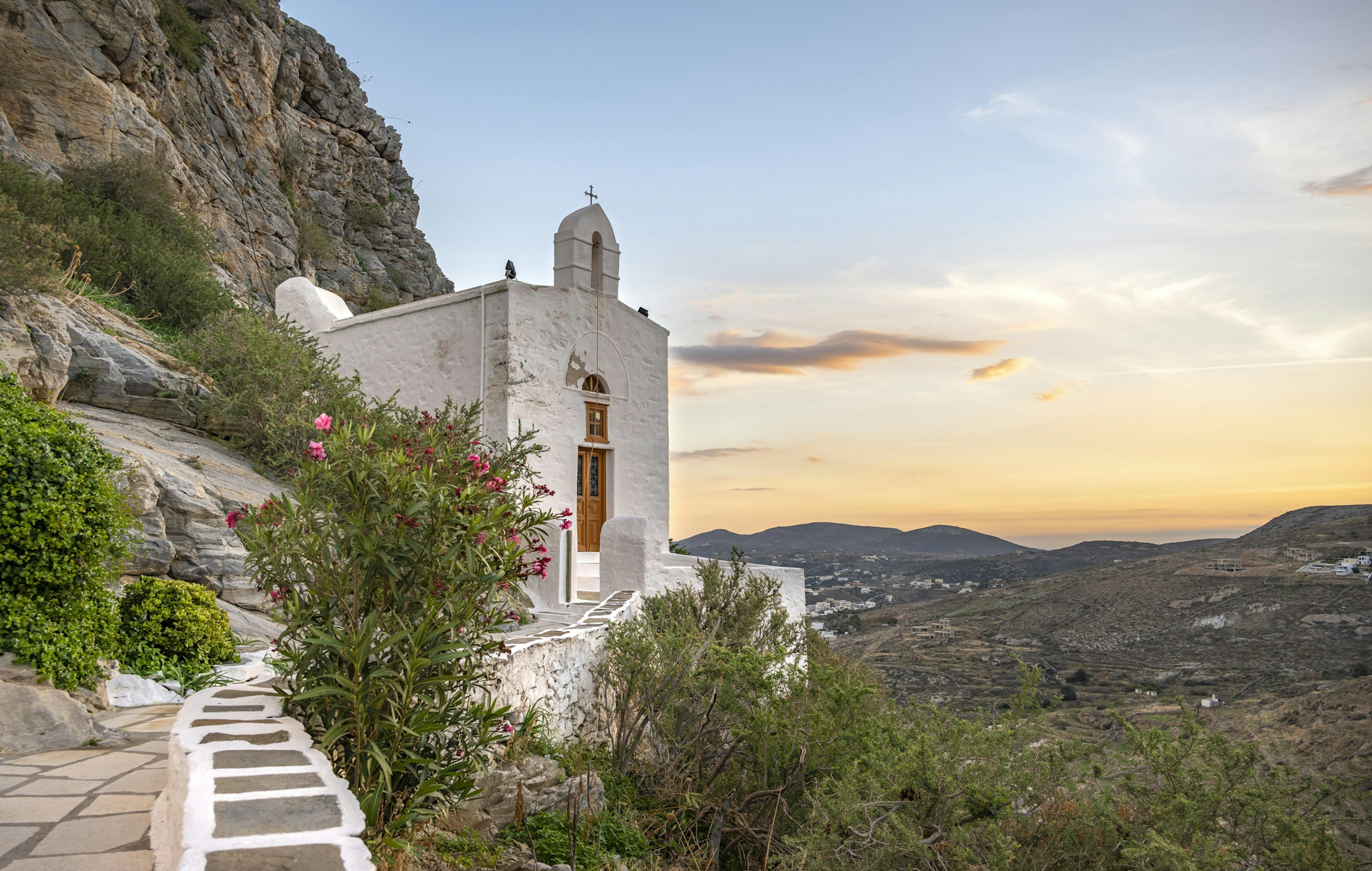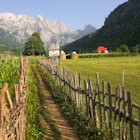

Wander the colorful alleyways of Ano Syros in the the Cyclades ТЉ iStockphoto/ Getty Images
Endearing little Syros merges traditional and modern Greece. One of the smallest islands of the Cyclades and relatively rural outside the capital, it nevertheless has the highest population since itтs the legal and administrative center of the entire archipelago. Itтs also the ferry hub of the northern islands and home to Ermoupoli, the grandest of all Cycladic towns, with an unusual history.
As the Cycladesт capital, it pays less heed to tourism, and its beaches never get as crowded as those of the neighboring islands. It buzzes with life year-round, has great eateries and showcases the best of everyday Greek life.
If you want to add Syros to your Greek islands itinerary, here's what you need to know.

When should I go to Syros?
Summer on the island can be pretty hot, but since Syros isn't as heavily touristed as some other Cyclades destinations, you'll likely still find a nice spot on the beach to spread your towel, even during peak season. Compared to other Cyclades islands, Syros tends to be less crowded. Late spring and early autumn also offer pleasant weather, with mild temperatures and sunny days, making it an enjoyable time to explore the island.
Another excellent time to visit is during the off-season. Many hospitality businesses remain open, particularly in the lively main town of Ermoupoli. Unlike places like Mykonos or Santorini, businesses here aren't as strictly seasonal, and the ferries operate year-round since Syros serves as a major ferry hub for the Cyclades. Temperatures can drop to as low as 12 degrees (53F) in January and February, but the days will generally be bright at this time of year. If you visit in late February, you can take part in the vibrant celebrations for Apokries (Greek Carnival).
How much time should I spend in Syros?
You'll need at least a night or two here. While many visitors often treat it as a brief stopover in their Cyclades itinerary, Syros has enough to offer to warrant a bit more time. Allocate one day to explore Ermoupoli and perhaps another day to delve into the island's historical sites and beautiful beaches.

Is it easy to get to and around Syros?
Syros has an airport, and Sky Express flies from Athens to Syros Island National Airport in about 35 minutes. There is no public transport, but taxis congregate around flight times.
As the island groupтs capital, Syros theoretically has fair to good year-round ferry links with all the Cyclades islands and to Piraeus (Athens) on the mainland. High-season services to Ermoupoli include Piraeus, Kythnos, Naxos, Mykonos and Tinos. In general, frequencies and routes expand drastically in high season and can diminish to a couple of times a week in winter. Always check ahead (on a site like ) and reserve a ticket in high season.
Buses loop from Ermoupoli bus station beside the ferry quay, taking in the beach towns of Galissas, Finikas, Posidonia, Megas Gialos, Vari and Azolimnos. The full loop takes an hour, and buses run in both directions (at least three daily, increasing to hourly in the peak season). Three to five buses also go to Kini, some of which join the main island loop. There are also regular minibusses to Ano Syros from the waterfront end of El Vanizelou Street.
You can hire cars and scooters at agencies such as on the Ermoupoli waterfront. Avoid driving in central Ermoupoli, as there are lots of stairs, pedestrian-only lanes and one-way streets.
Top things to do in Syros

Eat your way through Ermoupoli
The capital's streets and many pedestrian precincts are busy by day and also at night when the air of purpose gives way to enjoyment. Strolling lanes shaded by canopies of bougainvillea and lined with markets, cafes, souvlaki stands, bars and more is one of Syros' great pleasures.
Running between the harbor and the square, Chiou is lined with shops selling local food products, including the island's excellent cheeses. Stop in for house-roasted coffee at the book-lined Corner Cafe. For sweets on the go, local legend Sykoutris Turkish Delights is an old-time maker of the Cycladic favorite. is simply superb. The owner will recommend what's on offer and made from fruits in season (the fleetingly available fresh fig is sublime).
For dinner, you can't go wrong at , a high-ceilinged restaurant with a bohemian interior that offers creative takes on taverna fare. In an upscale secluded Ermoupoli courtyard, you'll find ; a stylish spot with a creative Greek menu of locally-sourced food.
See Renaissance art in the Church of the Dormition of the Virgin
After being badly bombed during WWII, itтs a wonder anything survived in this stately 1820s Orthodox church т which made the discovery, in 1983, of a signed icon painted by El Greco even more extraordinary. The work dates from the 1560s before the artist left his native Crete to become a leading light of the Spanish Renaissance. Itтs now proudly displayed in the porch of the Church of the Dormition of the Virgin, to the right of the main door.

Plan a beach day
Outside Ermoupoli, Syros comprises a series of hills and valleys that fold down to small bays and beaches, most of which are well served by buses. Kini, on the west coast, is a sandy beach in a horseshoe bay with a small strip of bars and tavernas. Due to its shallow waters, itтs popular with families. Popular with French travelers, Galissas has an appealing beach, a smattering of white-and-blue-trim Cycladic buildings, some good tavernas and a cute little white church on the headland. On the other side of the church is Armeos, a pretty little pebbly nudist beach.
Further south, Finikas sits on a large bay with a marina at one end and a narrow strip of pebbles and sand. Itтs more built up than most of the others, with a somewhat shabby feel. Further along the bay is Voulgari Beach, near the village of Posidonia. South of the headland is tiny but popular Agathopes Beach, with calm waters and a taverna. Another 10-minute walk south brings you to Komito, a sheltered bay backed by olive groves.
The south-coast town of Megas Gialos has a couple of beaches hard up against the main road. Gorgeous (and sheltered) Vari, further east, is the better bet with its sandy beach, though the waterfront and tavernas get packed with families in high season.
Enjoy a sundowner in Plateia Miaouli
This great square is perhaps the finest urban space in the Cyclades. Once situated immediately upon the seashore, today it sits well inland and is dominated by the dignified neoclassical town hall. Flanked by palm trees and lined along all sides with cafes and bars, the square and accompanying statue are named for Hydriot naval hero Andreas Miaoulis.

Check out the views from St Georgeтs Cathedral
Proudly capping the medieval hilltop settlement of Ano Syros, this pretty cathedral is the mother church of the Cycladesт significant Roman Catholic minority. Call in to admire the pastel-hued interior and star-fretted barrel roof and enjoy the view of the medieval town below.
Visit the remote village of San Michalis for great food and views
Donтt miss the drive along the mountainous spine of Syros to the northern village of San Michalis, a small hamlet of stone houses and vineyards with spectacular views of unspoilt valleys and nearby islands on either side. Walk the rock path to St Michael's Catholic Church. Then, stop for excellent Syran food and grand views at timber-framed . It serves the renowned local cheese plus wood-fire-grilled meats.
How much money do I need for Syros?
As a result of the commercial activities on the island, there are plenty of hotels and restaurants, but the prices are lower than on the more touristically oriented islands.
hostel room: тЌ14 - тЌ20 per dorm bed per night in high season
basic hotel room for two: тЌ100 - тЌ120 per night in high season
self-catering apartment (including Airbnb): тЌ80 - тЌ120 per night in high season
public transport ticket: тЌ1.50 - тЌ1.60 one way on bus (children under 5 travel for free)
coffee: 50c for an espresso, тЌ3.20 for a latte/cappuccino
casual lunch: тЌ3 - тЌ5 for a gyros at a market
dinner for two: тЌ30 - тЌ50
beer: тЌ3
This article was adapted for digital from two of our Greek guidebooks. Our guidebook on Greece was written by Alexis Averbuck, Rebecca Hall, Paula Hardy, Helen Iatrou, Vangelis Koronakis, Vesna Maric, Leonid Ragozin, Simon Richmond, Helena Smith, Sarah Souli and Ryan Ver Berkmoes. Our guidebook on the Greek Islands was written by Kate Armstrong, Stuart Butler, Peter Dragicevich, Trent Holden, Anna Kaminski, Kate Morgan, Isabella Noble, Leonid Ragozin, Kevin Raub, Simon Richmond, Andrea Schulte-Peevers and Greg Ward.
Explore related stories









